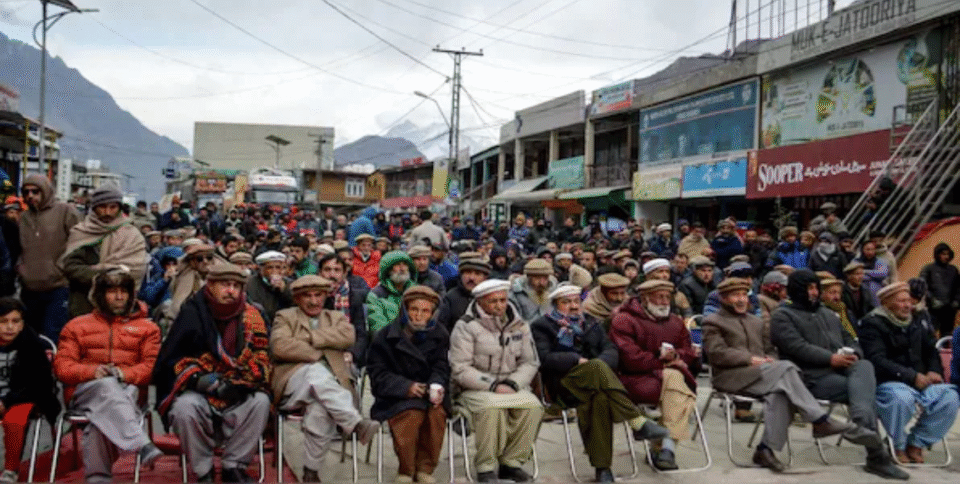Gilgit [Pakistan-occupied Gilgit-Baltistan], August 2: A mass protest by traders in Pakistan-occupied Gilgit-Baltistan (PoGB) has entered its 23rd consecutive day, with demonstrators blocking the Karakoram Highway, the key land route connecting Pakistan and China, to oppose what they call illegal federal taxation on a region with disputed constitutional status.
The blockade has effectively shut down all commercial and passenger movement between the two countries, leaving thousands of people stranded—including Chinese nationals, international tourists, and local residents. The Sost Dry Port, the critical entry point for goods under the China-Pakistan Economic Corridor (CPEC), has remained non-operational for weeks.
The protesters, led by local traders and supported by political, religious, and youth groups, argue that Pakistan’s federal taxes are unconstitutional in PoGB, which they say remains outside the formal constitutional framework of the country.
“How can the federal government impose taxes on people who are not constitutionally recognized as citizens of Pakistan?” asked Mohammad Ishaq, one of the lead protest organizers. “This is about ‘no taxation without representation’, a principle we are not ready to abandon.”
Economic Paralysis and Growing Local Anger
The protest is not just symbolic—it’s crippling the local economy. For nearly eight months, PoGB residents have reported severe disruptions across sectors:
-
Transporters and customs agents are out of work.
-
Goods worth billions are stuck at the Sost Dry Port.
-
Perishable imports have expired due to customs delays.
-
Rain has damaged goods stored in the open, protesters say.
Ahmed Nabi, a local businessman, told Dawn that only a select few have access to speedy customs clearance, while the majority suffer under discriminatory policies.
“The Pakistan Customs officials are not clearing our consignments. Our goods are rotting, while a few politically connected people are getting fast-track clearance,” he said.
Javed Hussain, another protest organiser, called this “economic exploitation”, warning the community will continue resisting unless their demands are met.
Legal and Political Ramifications
The protest isn’t just about taxes—it’s about Gilgit-Baltistan’s long-standing constitutional limbo.
Ayub Waziri, a member of the PoGB Assembly, reminded reporters that the Federal Board of Revenue (FBR) itself acknowledged last year that the region lies in a “non-tariff zone.” Yet, Islamabad has continued to impose taxes, prompting widespread unrest.
“This is not just a trader issue—this affects every citizen of Gilgit-Baltistan,” Waziri said. “The federal government needs to either resolve the constitutional status of this region or stop treating us like we belong only when it’s convenient.”
Moulana Sharfuddin, a prominent religious leader supporting the movement, said the protest has “awakened the GB people to their rights” and stressed that resistance would grow if the federal government continues to ignore local demands.

